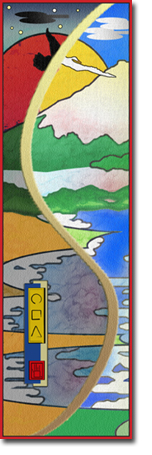On The Way: The Daily Zen Journal
West Mountain Evening Talk – Part 5
Muso Soseki (1275-1351)
The monk asked, “Zen masters these days give a koan to their disciples. This makes students study words, doesn’t it?”
The Master answered, “No, it doesn’t. Yuan-wu said, ‘Students who have just started Zen practice have no idea about it. So out of compassion the masters give them a koan as a signpost, so that the disciples can devote themselves to discovering oneness and dispelling random illusions, and to realizing finally that the Original Mind is not something that comes from outside. After that, all koans turn out to be pieces of tile for knocking at the gate.’
“Do you consider this explanation of Yuan-wu’s a deception? You must understand that Zen masters give their disciples a koan simply in order to guide them through the Gate of Satori into their own homes.
“Ta-hui used to cite a passage from some forerunner’s sermon, to his own students: ‘Don’t try to use your intellect to grasp the truth. Don’t just swallow everything that has been preached. And don’t lock yourself up in the storehouse, where nothing happens.’
“This teaching is a sign of Ta-hui’s deep, grandmotherly kindness. With it he blindfolds your eyes to let you see with your mind. You can understand from this that it is not words at all that Ta-hui wants you to study. Any students who have succeeded in returning their minds to the Original Silence by sitting on the zazen cushion but are still content with their marvelous skill with words are still a long way from the true  study of mind.
study of mind.
“These two masters set forth the very core of Zen practice. But most students these days fish words and dialogues of the masters out of books and store them in their heads until they have a chance to spar with others, using their cleverness in Zen talk, and they flatter themselves that they have attained the subtle way of the Patriarchs. But this is just what Yuan-wu calls conceit and delusion.”
The monk questioned him again, “Those students who repeat Zen stories secondhand, and swallow hearsay and gossip, and convince themselves that they have attained satori are of course full of conceit and delusion. But there are some very gifted students who have penetrated to the core of Zen words. Are they not to be called people of satori?”
The Master answered, “Even those who have a keen insight into Zen words are to be called people accomplished in words but not in mind unless they have attained clear satori. As for those who merely pass on secondhand stories, swallow rumors, and gossip, they are not worth commenting on. A master says, ‘Just grasp the essence, don’t concern yourself with the results.’
“Attaining genuine satori is the essential. The manifestation of its great work is the result. It’s like planting a tree. If the root goes deep, the leaves and flowers and fruit will be sure to flourish.
“Ta-hui say, ‘In Zen practice generally, result is not everything.’
The monk asked, “If words and letters have a bad influence on students at the beginning, why did the masters in the past leave so many words of different kinds—the daigo, betsugo (supplementary words), nenko (short comments), and juko (poetic comments) which are now widely used?”
The Master answered, “Those masters of discerning insight had a perfect command of words, and they used their skill to teach their disciples. Each word and phrase may show a different aspect of Zen, but each is no more than a means—like the woman’s call for her maid, not for an errand but simply so that her lover would hear her voice and know that she was there inside the window. The masters’ words did no harm to their students, and some bright ones grasped the essential beyond those words.
“But with the passage of time, misunderstandings inevitably occurred. Many stupid people came along, like the man who spent all his time watching the old stump into which a rabbit had run and killed itself—he was waiting for it to happen again. Or the one who dropped his sword into the current from his moving boat and marked the side of the boat to show where it fell, and then searched in the water underneath. Then every five hundred years or so a great master appears in the world who can wipe out all these accumulated evils. That is what is called ‘breaking the deadlock’ or ‘family broken up, house ruined.’
“Once Yuan-wu, when he was living on Chia Mountain, prepared lectures for this disciplies, called Hsueh-tou’s Hundred Koans with Verse Comments. Later the lectures were compiled and published under the title of The Blue Cliff Record. But Fochien, a Dharma brother, wrote to him reproachfully, saying, ‘When I served Wu-tsu Fa-yen he encouraged us by saying, “Each of you, when you become a Buddha some day, a teacher of the world, be sure that you devote yourselves entirely to “this matter”– I mean the attainment and deepening of satori.”‘
“I was so impressed by his words that I have never forgotten them. I hear that you have added many comments to Hsueh-tou’s Verse Comments, with a view to helping your students to understand. When I learned that I could not help shedding tears. I thought you were a man of true satori. Why on earth have you been doing such a thing? Why don’t you show your disciples the one Original Truth that was there before Bodhidharma visited China? And so on…..’ According to Ta-hui’s Discourses, ‘When my teacher read Fo-chien’s letter he gave up the undertaking.’

“But some meddlesome fellows published Yuan-wu’s lectures in book form and so they came into general use. Later, Ta-hui burned the printing blocks. That was an example of ‘family broken up, house ruined.’
“In 1304, two hundred years after the blocks were burned, Chang Ming-yuan republished the book, which was then widely read. A man named Old Man San-chiao wrote a preface to it. He said, ‘Someone asked me whether it would be better to keep the copies of The Blue Cliff Records or to burn them. I answered that either would be good…’
“The writer of the preface maintains that there is a good reason for both of the contradictory things: for Yuan-wu’s lectures and for Ta-hui’s burning them. This official is ignorant of the fact that the masters’ intention was neither to keep nor to burn the book.
“Before the days of Ma-tsu and Pai-chang, masters put much emphasis on richi and little on kikan. Later they paid a great deal of attention to practice and little to theoretical study. Later, in the days of Feng-hsueh and Hsing-hua, they resorted to higher expressions of Zen experience, and this tendency made it more difficult to grasp their teachings.
“This is another example of ‘breaking the deadlock.’ After all, we should remember that the Patriarchs’ aim is neither study nor practice, but that both are merely means, like the woman calling her maid for no errand. So the Master says, ‘If I meet someone who is ready for my Dharma, I will hand it on to that person. Otherwise, I will leave everything to the way of the world.’ He adds, ‘Face the Buddha’s teachings as though they were the enemy you will never forgive, and then you may learn something of them.'”
Muso Soseki (1275-1351)
Excerpted from Sun at Midnight Poems and Sermons




There are countless schools of Zen and Buddhism, each offering their own entry into practice. Koan practice or “just sitting” practice appeals to different people's sensibilities, but any practice can fall into extremes of spiritual “one-up-manship.” The Blue Cliff Record is a collection of encounters between a master and student that sound irrational, but the intent was to test a student's understanding. The true study of koans today would necessitate a contemporary Zen master who could guide you and therefore, help avoid the pitfall of thinking you've attained something.
Students of all times have fallen into the trap of confusing the reading of teachings or koans with commentaries and thinking that they've finally “got it.” And it is natural to want a foot hold into practice, a place to stand, a sense of knowing where you are in practice. However, ironic as it sounds, that is really the last thing you really want.
Even though few of us would be classified as genius, Yuan-wu's suggestions about how to proceed in a daily, practical way are very useful:
'If you are someone with great inborn genius there is no need to make a study of the old words and koans. When you wake up in the morning make your mind clear and calm. Whatever has to be done then, do it as well as you can. Afterward, think it over carefully, and see what you have done and what it amounts to. When you have done these things thoroughly you will find yourself right there in the monastery of purity and no-happening.'
Some of us are practical types and want clear guidance, and as the years progress, different aspects of teaching appeal to us more as our life experience deepens. And for most of us there is still no problem reading koans, sutras, or contemporary Zen masters. They are all expedients and keeps our minds inclined to the Way.